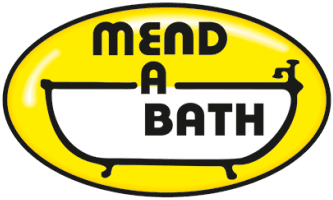One of the first questions we will normally ask you is, ‘what kind of bath do you have’? At Mendabath we are able to restore and resurface all types of baths however they all have their own unique characteristics and thus methods to prepare and restore them. It is therefore important for us at the quoting stage to know what kind of bath you have. There are generally two types of baths; metal based or fibreglass/composite based baths. Metal based baths cover both cast iron and pressed steel baths and have a vitreous enamel coating while fibreglass/ composite baths are all baths with a gel coating finish.
The first step in determining if your bath is a metal or fibreglass bath is to get a magnet off the fridge and see if it will stick to the bath surface. If it does you most certainly have a metal based bath which will either be cast iron or pressed steel bath.
The most common metal based bath in the UK is a pressed steel bath. These baths are made from steel with a thin layer of vitreous enamel coating over the sheet metal base. These baths are fairly inexpensive and relatively hard wearing. The two main pitfalls of a pressed steel bath are; firstly there is a massive difference in the quality of pressed steel baths available for sale. A poor quality bath will have an extremely thin layer of vitreous and will wear relatively quickly requiring the bath to be resurfaced or replaced. The other issue with pressed steel baths is that they tend to rust on the front lip and around the plug area and overflow. Once a pressed steel bath starts rusting, in these areas our advice would be to replace the bath, as it is impossible to effectively treat and stop the rust from returning.
Our favourite bath is the traditional cast iron bath, these can sometimes be the beautiful free standing roll tops or good old solid square edged boxed in baths. Some square edged cast iron baths will have detailing around the edge enhancing their elegance. Given that commercially produced pressed steel baths have only been around since the late 50’s early 60’s, any bath older than this is almost certainly a cast bath.
The casting process has been around for centuries tracing back to 1300bc in China, however this process was only first used to create baths as we know them in 1883. Cast iron baths consist of a thick cast iron base and a covering of vitreous enamel which again is baked on, in a kiln at circa 1000 degrees Celsius. These baths are the most durable of the bath options and in many cases last well more than a lifetime, in fact with a cast iron bath, which can be resurfaced an infinite amount of times, their life span is literally limitless. A cast iron bath will give you the most luxurious bathing experiences as they are generally wider and deeper than other baths and they hold the heat from the water better than all other bath types. If you have a cast iron bath, you will notice these baths are really heavy, so not very easy to replace or move.
Acrylic baths are among the most popular baths at the moment. The reason for this is their modern appearance, limitless shapes and sizes and cheaper cost of production making them the affordable option too. An acrylic bath is easy to keep clean and fairly cost effective compared to a cast iron bath or pressed steel bath. However an acrylic bath can stain if the incorrect cleaners and bath products are used, they are also more susceptible to chipping than their vitreous enamel counterparts. Older acrylic baths also have a tendency to wrinkly and crack. This can allow bacteria to grow within the cracking resulting in an unhygienic surface.
Whatever kind of bath you have, when it starts looking a bit tired contact Mendabath to see if it can be restored. You can rest assured that if we do not think restoration is in your best interests we will recommend you look at replacement. That is the advantage of using Mendabath as we guarantee all our work without exception. If we don’t believe it will last through the guarantee we will recommend replacement, giving you peace of mind that you are getting the best advice for your specific circumstances.

 Rated 5 from over 70 reviews
Rated 5 from over 70 reviews